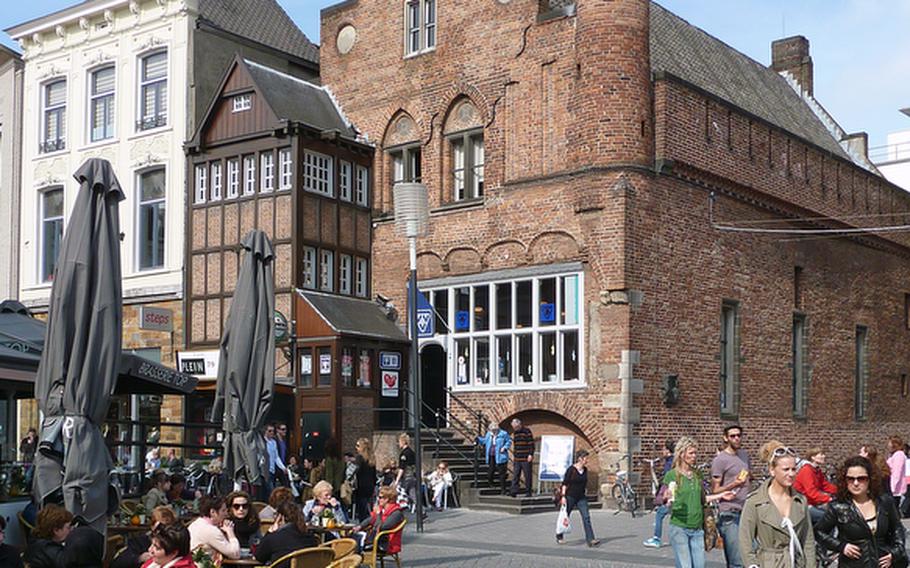
The tourist office in ?s Hertogenbosch is in this old building, the Moriaan, on the town's marketplace. It is considered one of the oldest brick buildings in the Netherlands. (Michael Abrams/Stars and Stripes)
The first thing you have to learn about this city in the central part of the Netherlands is what to call it.
Its official name is ’s Hertogenbosch, which means the duke’s forest. That’s too long for the Dutch, who simply call it Den Bosch. Complicating things for a foreign visitor, they pronounce Bosch like Bruce Springsteen’s nickname.
The duke in the city’s name was Hendrik I of Brabant. In 1185, he granted the community on the Dommel River a city charter and the rights to trade. The fortified city was also to serve as a defense against his rivals.
One of the city’s best-known residents was medieval painter Hieronymus Bosch, born here in the 15th century. A statue of him stands on the city’s marketplace, which is also a good place to start a tour of Den Bosch.
As it is easy to tell from the year of its charter, the city is old. Nothing exemplifies that more than the Moriaan, a building standing on one corner of the Markt. It dates to the 13th century and is believed to be one of the oldest brick buildings in the Netherlands.
It was originally built for a noble family and has seen many uses. Today, the city’s tourist office is located here, and for 2 euros you can get a map of a walking tour of the old town that goes through narrow brick lanes, past old gabled buildings and over stone bridges.
When walking through Den Bosch it is important to look up as well as down. With a sharp eye you will see a variety of figures adorning the walls, such as the Virgin Mary, a swan, lions’ heads and “De Halve Peer,” the statuette of half a man with a pear-shaped belly.
Looking down you will discover the Binnendieze, a canal system that runs under and through the town. From mid-April to October you can take boat trips on the waterway.
On the other end of the old town, Sint Jan (Saint John’s) Cathedral towers over ’s Hertogenbosch. This Gothic house of worship was built between 1380 and 1529. The church’s brochure lists some interesting numbers for the structure: number of roof tiles: 700,000; statues inside and out: about 600; number of bells in the tower: 59; weight of the largest: 12,100 pounds. Its biggest attraction, though, is the 13th-century statue of the Virgin Mary holding the Christ Child.
Market days on the Markt are Tuesdays to Saturdays. On the Friday we were there, vendors were offering fresh fish, cheese and fruits and vegetables.
On the market square, check out the 17th-century town hall with its 35-bell carillon and next to it, the city’s narrowest building, de Schietspijp, or the Guns Barrel.
One of the things you really don’t see on the walking tour is the city fortifications. Some of the walls along the Binnendieze are the oldest fortifications, but others are along the banks of the Dommel. Outside of the old town, guarding the river is the city’s citadel.
Den Bosch is popular for its shopping and for getting something to eat. Join the locals for lunch on the Markt, or at the many restaurants around the intersection of Korenbrugstraat and Molenstraat.
abramsm@estripes.osd.mil